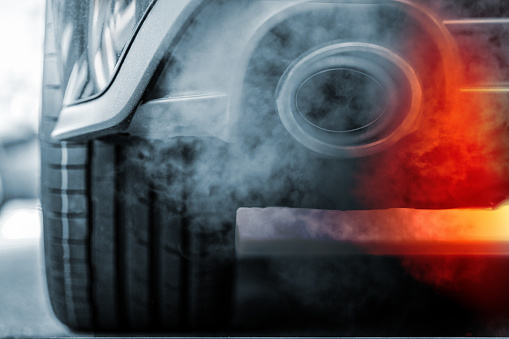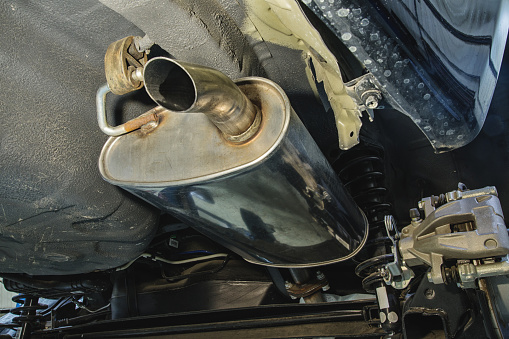February 21, 2025
What are the signs that your exhaust may need repairing?
There are several signs that your exhaust may need repairing. Here are some of the most common ones:
- Loud exhaust noise: If your exhaust is making a loud noise, it could be a sign that there is a problem with the muffler or another component of the exhaust system.
- Reduced fuel efficiency: If you notice that your car is not getting as many miles per gallon as it used to, it could be due to a leak in the exhaust system.
- Strange smells: If you smell a strange odor, such as sulfur or rotten eggs, coming from your car, it could be a sign that there is a problem with the catalytic converter.
- Vibrations: If you feel vibrations in the steering wheel, floorboards, or pedals, it could be due to a damaged exhaust pipe or muffler.
- Check engine light: If the check engine light on your dashboard comes on, it could be a sign that there is a problem with your exhaust system.
If you notice any of these signs, it is important to have your exhaust system inspected and repaired by a qualified mechanic as soon as possible to prevent further damage and potentially hazardous situations.
What are the consequences of a faulty exhaust pipe?
A faulty exhaust pipe can have several consequences, some of which can be dangerous. Here are some of the most common consequences of a faulty exhaust pipe:
- Reduced performance: A faulty exhaust pipe can cause a decrease in engine performance, resulting in reduced power, acceleration, and fuel efficiency.
- Increased emissions: A damaged exhaust system can lead to increased emissions, which can be harmful to the environment and can also cause your vehicle to fail emissions tests.
- Loud noises: A damaged muffler or exhaust pipe can cause your vehicle to make loud noises, which can be annoying and disruptive to other drivers and passengers.
- Carbon monoxide poisoning: A leak in the exhaust system can cause carbon monoxide to enter the passenger compartment of the vehicle, which can lead to carbon monoxide poisoning. This can be very dangerous and potentially deadly.
- Engine damage: A damaged exhaust system can also lead to engine damage, as the engine may be exposed to excessive heat and pressure.
In summary, a faulty exhaust pipe can have a range of negative consequences, including reduced performance, increased emissions, loud noises, carbon monoxide poisoning, and engine damage. It is important to have any issues with your exhaust system addressed promptly by a qualified mechanic to prevent these problems from occurring.
How can you repair your exhaust at home?
Repairing an exhaust system at home can be challenging and may require some mechanical expertise, but it is possible in some cases. Here are some steps you can take to repair your exhaust system at home:
- Identify the problem: Before you start repairing your exhaust system, you need to identify the problem. Inspect the exhaust system to determine if there are any cracks, holes, or leaks. You can also start the engine and listen for any unusual sounds.
- Purchase the necessary parts: Depending on the nature of the problem, you may need to purchase replacement parts such as clamps, hangers, pipes, or mufflers. You can buy these parts from an auto parts store or online.
- Remove the damaged parts: Use a wrench or socket set to remove any damaged parts of the exhaust system. Be sure to wear protective gloves and eyewear to prevent injury.
- Install the replacement parts: Install the replacement parts in place of the damaged parts. Be sure to tighten all bolts and clamps securely.
- Test the system: Start the engine and listen for any unusual sounds or leaks. You can also use a piece of tissue to check for any air leaks in the system.
Note that repairing an exhaust system at home can be dangerous if not done properly. It is recommended to have any major repairs done by a qualified mechanic to ensure the safety and integrity of the system.
How do you know if your exhaust is cracked?
You can check if your exhaust is cracked through a few signs:
-
Loud noises: If you hear a loud, rumbling sound coming from the exhaust system, it could be a sign of a crack. Cracks in the exhaust can cause exhaust gases to escape, creating a louder than usual sound.
-
Exhaust fumes inside the car: If you notice a strong smell of exhaust fumes inside the cabin, it could indicate a crack in the exhaust system. This is especially concerning as it can be harmful to your health.
-
Vibrations: If your car shakes or vibrates excessively, particularly when idling or accelerating, it may point to a crack or damage in the exhaust system.
-
Decrease in fuel efficiency: A crack in the exhaust can affect the engine’s performance, causing a drop in fuel efficiency.
-
Check engine light: A cracked exhaust may trigger the check engine light if it affects the engine’s emissions or other components like the oxygen sensor.
-
Visible damage: Inspect the exhaust pipe for any visible holes, cracks, or rust, which could indicate a crack.
If you notice any of these signs, it’s a good idea to have your exhaust system inspected by a professional mechanic to determine if it needs repair or replacement.


